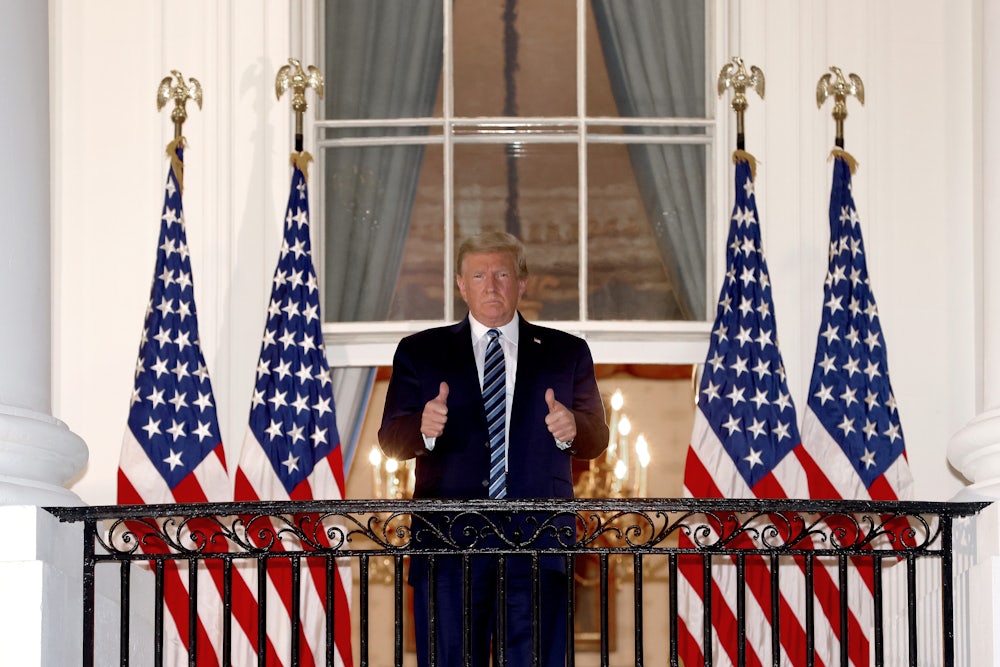With a month to go before the November election, Donald Trump has returned to the Covid-19 message he, his administration, and his allies pushed in the early spring. “Don’t let it dominate you,” Trump said in a video released Monday evening, shortly after he left Walter Reed Medical Center, where he had been treated for several days for Covid-19. “Don’t be afraid. You’re gonna beat it!” Channeling Evita, he waved, maskless, from a White House balcony, posturing that he had beaten the virus despite the fact that he was both very contagious and apparently very symptomatic.
The following day, he suggested that Covid-19 was no different from the flu, tweeting: “Flu season is coming up! Many people every year, sometimes over 100,000, and despite the Vaccine, die from the Flu. Are we going to close down our Country? No, we have learned to live with it, just like we are learning to live with Covid, in most populations far less lethal!!!”
The difference between this message and the one he pushed in February—that Covid-19 was overhyped, a “hoax” being built up to damage the economy—is not so much substance as context. What we have experienced over the last seven months is not comparable in any way to flu season. Over 200,000 Americans have died. The economy has tanked, shedding tens of millions of jobs. The White House itself is the center of a massive Covid-19 outbreak that has infected the president, the first lady, several senators, and many other administration and Republican Party officials. Far from a beacon of resilience, the president has become a symbol of just how deeply the country has been affected by the pandemic. In public appearances since contracting the virus, he appears hoarse, shaky, and frightened; reports of his hospitalization include at least two concerning drops in oxygen level and a cocktail of drugs that indicate pneumonia.
For the last four years, Trump’s supporters and detractors have retconned his 2016 victory, arguing that, having won an improbable election, the president must be a political genius. In this school of thought, Trump’s psychotic tweets and staggering incompetence are rendered into perverse strengths: We are playing checkers; he is playing chess. This narrative deserved to die an agonizing death years ago and should now be cast aside forever. Trailing in the polls with only 30 days left before the 2020 election, the president has embraced a reelection strategy that is, even for him, profoundly stupid.
When Trump was initially diagnosed with Covid-19, there was some speculation that this could actually be good for him. The president’s haphazard pandemic response has received abysmal marks: Here was an opportunity to change the narrative. There could, some added, be a “rally round the bedside” effect, similar to what happened following U.K. Prime Minister Boris Johnson’s hospitalization for Covid-19 in the spring. “This moment is an opportunity for Trump to hit reset on his tone-deaf message on COVID that we are always on the cusp of seeing the definitive end of the virus,” wrote the editors of The National Review. “His lack of realism during the pandemic is one reason his ratings on handling it are so low.” Get the message right, this line of thinking goes, and Trump can save his campaign.
This argument assumed that Trump could adopt humility and use his physical weakness as a political strength—that he could even admit fault, recognizing his own failures and the importance of frontline workers and first responders. Voters didn’t think Trump was taking Covid-19 seriously; here was an opportunity to show them just how seriously he was taking the virus.
The president has—characteristically—taken the opposite path. Despite the fact that he is still obviously ill, he and his allies are insisting that he is not just fine but better than ever. Trump has said that he feels better than he has in “20 years” and speculated that he is “immune” to the virus. The message is not just that an unhealthy, out-of-his-depth president is an American ubermensch but that, by not dying, he has shown the country the way to beat the virus: change absolutely nothing and go about business as usual with a casual disdain for basic safety protocols.
The last week of Trump’s campaign has been a greatest hits of his worst political instincts. At last week’s debate, he failed to condemn the Proud Boys, a right-wing gang with ties to white nationalist groups. The moment echoed his “very fine people on both sides” comments in the wake of Charlottesville in 2017. On Tuesday, moreover, he announced that he was breaking off talks about a potential stimulus package until after the presidential election. The move tanked the stock market and further damaged his reelection chances. The author of The Art of the Deal was also making a basic and catastrophic negotiation error, accepting the blame for both the stock market collapse and the lack of stimulus.
All of this is occurring in the midst of a polling collapse. Trump is now trailing with every age group of voters and is underwater with senior citizens—a voting block that helped him immensely in 2016. He is trailing by increasingly large margins in every swing state and appears to be pulling away in Florida and Pennsylvania. A landslide defeat grows more likely by the hour; everything the president has done to try to stem the tide has only made things worse.
Some are understandably pointing to 2016 as a reason to continue to take Trump’s chances seriously. Anything can happen in the next 30 days—although, over the last nine days, the president saw the contents of his tax returns revealed by The New York Times, had the worst debate performance in American history, and contracted Covid-19. But Biden’s lead has been more stable than Clinton’s was four years ago. And he has another ace up his sleeve: Donald Trump can’t do anything right and is doing everything wrong.
